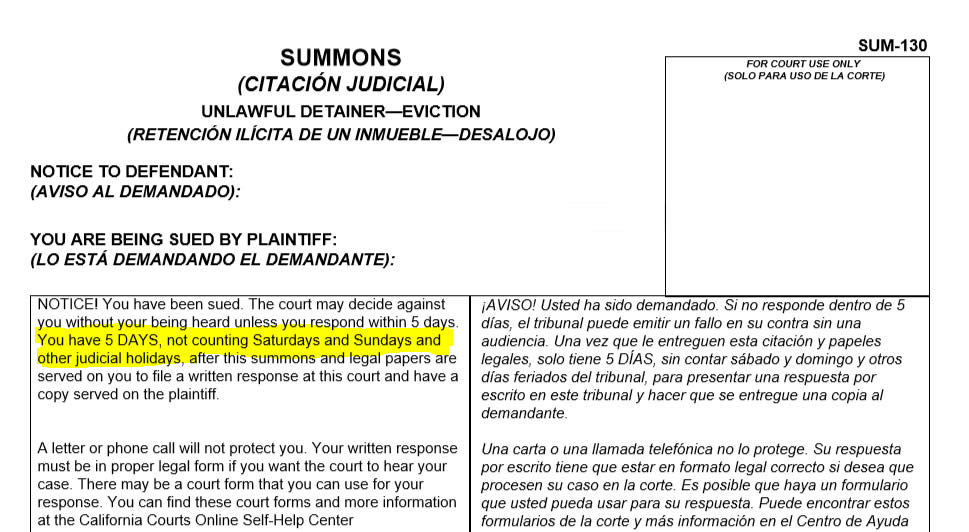New California Unlawful Detainer Eviction Rules Effective September 1, 2019
New California Unlawful Detainer Eviction Rules Effective September 1, 2019
by, Direct Legal Support / Read the Original Article
Direct Legal are our Featured Industry Experts for California Legal Support / We value Mr. Kern and his team – “Our team of professionals provides our clients with superior expertise in the areas of Service of Process, Court filing, Skip tracing and On-site document reproduction. Dave Kern, the founder of Direct Legal Support, Inc., maintained a basic and extremely successful philosophy of not being the biggest, but being the best attorney service in California. Michael Kern, son and CEO of Direct Legal Support was brought on in 1987, and has had his hand in every aspect of litigation support service ever since” He Say’s.
They are listed on our: Directory of Legal Professionals: Working in the State of California – If you need Legal Support Contact them today.
New California law amends Sections 1161 and 1167 of the Code of Civil Procedure, relating to real property.
AB 2343, Chiu. Real property: possession: unlawful detainer.
(1) Existing law establishes a procedure, known as an unlawful detainer action, that a landlord must follow in order to evict a tenant. Existing law provides that a tenant is subject to such an action if the tenant continues to possess the property without permission of the landlord in specified circumstances, including when the tenant has violated the lease by defaulting on rent or failing to perform a duty under the lease, but the landlord must first give the tenant a 3-day notice to cure the violation or vacate.
This bill would change the notice period to exclude judicial holidays, including Saturday and Sunday.
(2) Under existing law, a plaintiff that wishes to bring an action to obtain possession of real property must file a complaint and serve the defendant with a notice of summons, in which case the defendant has 5 days to respond.
This bill would clarify that the period in which a defendant may respond to a notice of summons does not include judicial holidays, including Saturday and Sunday.
(3) This bill would provide that these provisions would become operative on September 1, 2019.
California Judicial Counsel has adopted a new revised Unlawful Detainer Summons (SUM-130) for mandatory use effect September 1, 2019. The summons reflects the change in the law advising the defendant(s) that they have “5 DAYS, not counting Saturdays and Sundays and other judicial holidays after the summons and legal papers are served” to file a response to the lawsuit. The law applies to 3-Day Notices to pay Rent of Quit and Notice to Quit as well in regards to Saturdays, Sundays and Judicial Holidays are also not counted, when the tenant must cure the defect stated in the notice, i.e. pay the rent, vacate the premises, remove animals, etc.
You can find the new form here: California Unlawful Detainer Eviction Summons (Revised September 1, 2019)
As always, if you have any questions or concerns, please contact a member of our Direct Legal Support team.

Direct Legal Support, Inc.
Call: (800) 675-5376
Email: support@directlegal.com
Visit: www.directlegal.com
Tags: California Eviction Articles, Eviction Information, Landlord Information, Legal Articles, Process Service News





 A companion measure that requires landlords to more throughly account for security deposit funds withheld for repairs passed along the same line. That ordinance also allows tenants to pay security deposits in installments over three months.
A companion measure that requires landlords to more throughly account for security deposit funds withheld for repairs passed along the same line. That ordinance also allows tenants to pay security deposits in installments over three months.
 From July 1, Florida Supreme Court justices with permanent homes outside Leon County will be able to request a district court of appeal courthouse, county courthouse or other facility as their official headquarters, under
From July 1, Florida Supreme Court justices with permanent homes outside Leon County will be able to request a district court of appeal courthouse, county courthouse or other facility as their official headquarters, under 
 Disputes between landlords and tenants often arise over issues such as the length of the lease, the amount of rent to be paid, maintenance, repair and replacement obligations, size of the space to be provided, and what services are to be delivered. Challenges can also surface as a result of corollary issues such as renewal and purchase options, rights of first refusal and accommodations required by lenders. NationalEvictions has the top attorneys with extensive experience in representing both landlords and tenants of Residential, Commercial and Industrial properties.
Disputes between landlords and tenants often arise over issues such as the length of the lease, the amount of rent to be paid, maintenance, repair and replacement obligations, size of the space to be provided, and what services are to be delivered. Challenges can also surface as a result of corollary issues such as renewal and purchase options, rights of first refusal and accommodations required by lenders. NationalEvictions has the top attorneys with extensive experience in representing both landlords and tenants of Residential, Commercial and Industrial properties.










